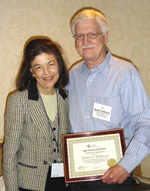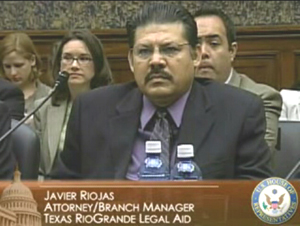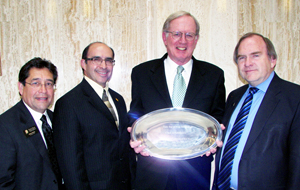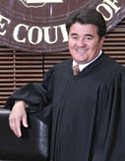LSC News
House Approves $35 Million for Foreclosure Legal Assistance
On May 8, the U.S. House of Representatives passed a comprehensive housing package that includes a new source of grant funds for legal aid programs working to help low-income Americans save their homes from foreclosure.
The American Housing Rescue and Foreclosure Prevention Act of 2008, H.R. 3221, would give the Neighborhood Reinvestment Corporation $35 million to distribute in grants to organizations or attorneys that can provide legal assistance related to home ownership preservation, home foreclosure prevention, and tenancy associated with home foreclosure. Priority will be given to organizations providing assistance in the 100 metropolitan areas with the highest rates of foreclosure and that can begin utilizing the funds 90 days after receiving them. No funds can be used for class action litigation. Counseling agencies approved by the Department of Housing and Urban Development can also apply for the funds, but 60 percent of the $35 million must be used specifically to provide legal assistance.
The measure was sponsored by Representatives Melvin Watt, D-N.C., Nydia Velazquez, D-N.Y., and Al Green, D-TX, and was added to the bill during a markup in the House Financial Services Committee, led by Reps. Barney Frank, D-Mass., and Spencer Bachus, R-Ala.
"Increasing numbers of foreclosure victims are turning to legal services programs for assistance," said Rep. Green. "The Watt-Velazquez-Green amendment will provide a helping hand and provide legal assistance to those homeowners and renters in areas struggling with the biggest foreclosure problems. Borrowers and homeowners are trying to do what is right, but they often do not have and cannot afford the legal advice they need-legal advice that can make a meaningfully positive difference."
The Senate approved similar legislation in April, but Senator Barbara Mikulski's, D-Md., effort to include the legal assistance funding was rejected on procedural grounds. The House and Senate will have to reconcile differences in the two bills before sending a final version to the President, who has threatened to veto both versions.
Click here for more information on the bill.
back to top ^
ABA and NLADA Host 2008 Equal Justice Conference
On May 7-9, the American Bar Association (ABA) and the National Legal Aid and Defender Association (NLADA) hosted the 2008 Equal Justice Conference in Minneapolis, Minn. The annual conference brings together representatives from all corners of the equal justice community-legal aid programs, state and local bar associations, the courts, private law firms, and corporate legal departments-for discussions and trainings on the current issues impacting the delivery of legal services to the poor. This year's conference, "Pursuing Justice: Balancing Challenges and Opportunities," celebrated the ongoing collaboration between pro bono and legal aid, explored the creation of additional partnerships, pinpointed new resources to be tapped, and identified new issues facing clients.
Peter B. Edelman-Georgetown University Law Professor, Chair of the District of Columbia Access to Justice Commission, and Board Member of the Friends of Legal Services Corporation-opened the conference with a speech on the challenges confronting equal access to justice in the 21st Century. ABA President William H. Neukom delivered the keynote address at an awards luncheon, where he highlighted the ABA's steadfast support for the Legal Services Corporation and the crucial need to increase LSC's funding. At the luncheon, Iowa Legal Aid Executive Director Dennis Groenenboom accepted the NLADA's Innovations in Equal Justice Award on behalf of his program. The annual award recognizes the successful use of technology to better serve the low-income community. Iowa Legal Aid has long been a leader in the use of technology, pioneering the use of a statewide web-based case management system, launching a project to place internet-connected computers in senior citizen centers, and launching a statewide legal assistance web site in 2003. Congressman Keith M. Ellison, D-Minn., closed the conference.
LSC President Helaine M. Barnett joined Don Saunders of the NLADA and Deborah Hankinson, Chair of the ABA Standing Committee on Legal Aid and Indigent Defendants, to lead a session entitled, "Hot Topics in Legal Aid," which focused on developments at LSC, private attorney involvement initiatives, the status of loan repayment assistance programs in Congress, and other issues. Barnett also delivered remarks at a session entitled, "LSC Updates," where she discussed the recent Government Accountability Office reports on LSC, the 2009 competitive grants process, elements of LSC's Quality Agenda, LSC's development of a technology strategic plan, and LSC's Executive Directors Conference in Washington, D.C., from June 10-11.
Staff from LSC's offices of Program Performance and Compliance and Enforcement presented at a number of sessions on issues such as technology, pro bono, leadership mentoring, innovations in intake, and recruitment and retention.
Barnett and LSC Board Chairman Frank B. Strickland also attended a day-long meeting of the National Chairs of Access to Justice Commissions.
Click here for more information on the conference.
Click here to access conference materials hosted by the Legal Services National Technology Assistance Project web site.
back to top ^
LSC President Attends Midwest Project Directors Meeting

LSC President Helaine M. Barnett stands with Richard Halliburton, retired Executive Director of Legal Aid of Western Missouri.
On May 9, LSC President Helaine M. Barnett spoke at a meeting of the Midwest Project Directors Association in Minneapolis, Minn. The Association is a group of leaders from 19 LSC-funded programs in the region. Representatives from 12 programs attended.
Barnett updated the attendees on recent developments at the Legal Services Corporation, including the FY 2009 appropriations process, LSC's response to the recent Government Accountability Office reports, news from the recent LSC Board meeting in Oklahoma, the 2009 competitive grants process, elements of LSC's Quality Agenda and LSC's focus on technology.
Richard Halliburton, who recently retired as Executive Director of Legal Aid of Western Missouri, was honored by the group, and by LSC, for his nearly four decades of service to the organization and dedication to the low-income community.
back to top ^
Texas RioGrande Legal Aid Adopts Pro Bono Resolution
The Board of Directors of Texas RioGrande Legal Aid has adopted a resolution aimed at increasing the involvement of private attorneys in the delivery of legal services to their clients, bringing to 88 the total number of programs who have adopted such resolutions.
LSC is encouraging all program Boards of Directors to adopt pro bono resolutions modeled after one adopted by LSC's Board in April 2007. Urging programs to adopt local resolutions is a key element of LSC's private attorney involvement action plan, entitled Help Close the Justice Gap, Unleash the Power of Pro Bono.
Click here for the list of LSC-funded programs that have adopted pro bono resolutions.
back to top ^
Field News
Legal Aid of Middle Tennessee to Help Parents of Special-Needs Kids
The Nashville office of the Legal Aid Society of Middle Tennessee and the Cumberlands has launched a new program to provide legal assistance to parents of children with special educational needs.
Made possible, in part, by a $50,000 grant from an anonymous donor, the new program will provide parents with everything from legal advice to representation in court, and hopes to identify systemic problems to bring to the attention of education officials.
The Tennessean reports that Nashville's special education system has been criticized recently for disproportionately singling out African-American students and for failing to provide services to suspended students, as required by law.
Gaye Carmon, a Nashville mother of an autistic first-grader, said, "If this program was up and running earlier, I probably wouldn't have hesitated filing a complaint and pursuing legal action. If parents feel they're not getting what their children need at school and facing a legal path and the cost that will go with it, it's a challenge. This makes me feel bold in asking for what my child needs. I don't feel so alone."
Click here to read, "Parents of special-needs kids offered legal aid," in The Tennessean.
back to top ^
TRLA Attorney Testifies on Problems with Guest-Worker Programs

Riojas, testifying before the U.S. House Committee on Education and Labor.
On May 6, Texas RioGrande Legal Aid's (TRLA) Javier Riojas, head of the organization's Eagle Pass office, testified before the U.S. House Committee on Education and Labor at a hearing entitled, "Do Federal Programs Ensure U.S. Workers are Recruited First Before Employers Hire from Abroad."
Riojas, a former migrant worker, told the Committee about TRLA's lawsuit against three agricultural employers and the U.S. Department of Labor (DOL), which it filed on behalf of 22 U.S. citizens and legal permanent residents who were passed over for jobs eventually given to Mexican citizens under the federal government's H-2B program. The program regulates recruitment of foreign guest workers for unskilled non-agricultural jobs. TRLA accuses the employers of purposefully misclassifying the jobs as non-agricultural in order to avoid the more stringent recruitment requirements of the H-2A program, which governs recruitment for agricultural workers. The suit also criticizes the DOL for continuing to approve the employers' applications, "despite mounting evidence of visa fraud and U.S. worker discrimination," said Riojas in his testimony.
Click here for more information on the hearing, including links to an archived web cast and a copy of Riojas' full written testimony.
back to top ^
Georgia Legal Services Receives $20,000 from UPS Foundation

Lisa Hamilton, President of the UPS Foundation.
The Georgia Legal Services Program (GLSP) has received a $20,000 grant from The UPS Foundation, the charitable arm of the Atlanta-based United Parcel Service (UPS), to help low-income persons with disabilities, who were inappropriately institutionalized, transition back into their communities.
GLSP attorneys will offer eligible clients legal assistance to access Medicaid Waiver programs to enable them to receive sufficient health care and other important services in their own homes.
"We seek to protect the most basic rights of individuals with disabilities, allowing them to make everyday choices for themselves and live with the maximum degree of independence possible," says Phyllis J. Holmen, executive director of the Georgia Legal Services Program. "The UPS Foundation is a significant partner in our critical work."
"UPS has a long-standing commitment to making communities all over the world better by supporting organizations and engaging over 400,000 employees in community service worldwide," said Lisa Hamilton, president of The UPS Foundation. "Together with nonprofit partners such as Georgia Legal Services Program, we work to make a positive impact on the lives of people in need."
back to top ^
New Mexico Legal Aid Attorney Honored for Public Service

Clark de Schweinitz, holding award, stands with (from left) New Mexico State Bar President-Elect Henry Alaniz, Supreme Court Chief Justice Edward Chvez, and Attorney General Gary King.
On May 1, New Mexico Legal Aid (NMLA) attorney Clark de Schweinitz received the 2008 Public Lawyer of the Year award from the New Mexico State Bar's Public Law Section. de Schweinitz was recognized for his long and dedicated service to low-income residents of northern New Mexico, his leadership role in the community, and his years of public service working to improve the lives of New Mexico residents.
In his 35 years of legal practice, de Schweinitz has focused on representing clients in administrative hearings and appeals before state and federal agencies-including a case where he helped establish a right to a hearing before Medicaid recipients can be denied benefits-and assisting community economic development groups. During his decade-long tenure as Executive Director of Northern New Mexico Legal Services, now part of NMLA, de Schweinitz helped shepherd the program through a severe funding crisis, and worked with the state bar to develop a strong pro bono program to assist senior citizens. He also actively participates in serving his community outside of his work, where he serves on the boards of directors of numerous community organizations, including the Health Center of Northern New Mexico, a local chapter of Habitat for Humanity, and New Mexico Advocates for Children.
"It is time that the Public Service Award be given to Clark de Schweinitz," said Margaret Carde, his supervisor at NMLA, "Not because he is a poster child for endurance and commitment, but because his expansive, unfailing good humor, steadfast common sense, and compassion for and hard work on behalf of the unfortunate should be given a spotlight so that the rest of us may pause to re-evaluate our own commitments in relation to his."
The award ceremony in the state capitol building attracted nearly 100 people, including New Mexico Supreme Court Chief Justice Edward Chvez, New Mexico Attorney General Gary King, New Mexico State Bar President-Elect Henry Alaniz, and LSC Board Member and New Mexico resident Sarah M. Singleton.
Click here for more information.
back to top ^
Pennsylvania Bar Demands More State Funding for Legal Aid
On May 5-6, the Pennsylvania Bar Association (PBA) held its 11th Annual PBA on the Hill program, which provides the state's lawyers an opportunity to engage directly with state legislators on issues of importance to the legal profession. This year, access to justice and civil legal services funding was the top priority of the attendees.
Over 150 bar members gathered on the steps of the state capitol building to urge the legislature to increase funding for legal aid by $1 million in the 2008-2009 fiscal year, to a total of $3.6 million. The bar association also called on lawmakers to pass bills that would establish loan repayment assistance programs for public interest lawyers.
"Too many Pennsylvania families and children are going without legal information, advice and representation during critical events in their lives," said PBA President Andrew F. Susko. "Every year, nearly one million Pennsylvanians victimized by domestic violence, mired in custody disputes, denied health care and faced with mortgage foreclosure receive some form of legal aid. Yet, many unmet needs remain and too many of our fellow Pennsylvanians are denied access to justice because there simply isn't enough help available."
Click here for more information.
back to top ^
Study: New England Renters Increasingly Victimized by Foreclosure
On May 6, the Washington, D.C.-based National Low Income Housing Coalition released a study showing that the majority of homes facing foreclosure in four New England states-Connecticut, Massachusetts, New Hampshire, and Rhode Island-are in multi-family buildings, and that nearly half are rentals.
The study relies on data from the Warren Group, which provides detailed, property-level information on real estate listings in the four states, on properties for which ownership has been transferred to the lender, or properties that have been scheduled for a foreclosure auction.
"This initial analysis confirms that the foreclosure crisis is not limited to-and may not even be predominated by-single-family, owner-occupied households," concludes the study. "These data make clear that limiting assistance to single-family homeowners or single-family properties in local, state, or national responses to the crisis will exclude a large number of affected families, including many lease-abiding renters who are the blameless victims of this crisis."
Tina Leahy, paralegal for Massachusetts' New Center for Legal Advocacy, an LSC-funded legal aid program, told the New Bedford Standard-Times that the foreclosure crisis is "just as bad for tenants as it is for homeowners. Some people who get a [foreclosure] letter don't know their rights, and they just up and leave. The fallout for tenants is tremendous, and there is a lack of affordable housing in Massachusetts."
Click here to download the study. ( 52k) 52k)
Click here to read, "Foreclosures hurt many renters, study says," in the Standard-Times.
back to top ^
Guam Chief Judge Champions Access to Justice
Mindy Aguon, KUAM-TV – May 1, 2008

Robert J. Torres, Jr., Chief Justice of the Guam Supreme Court.
"Access to Justice" was the theme of [May 1's] State of the Judiciary Address. Guam Supreme Court Chief Justice Robert Torres revealed his vision for the third branch of government, with the emphasis to make it easier for residents to obtain the justice they need and deserve. "I envision Guam as a place where everyone has equal access to justice - rich and poor, men and women, children and the elderly, military and civilian, immigrant and long-time residents," he announced.
Saying cooperation between the three branches of government is key in ensuring access to justice, Chief Justice Torres outlined his vision for the judiciary that includes concerted efforts with self-represented litigants, facilities, technological innovations and community participation and outreaches. Noting the growing trend of those who can't afford lawyers, Torres says the judiciary wants to make things easier. "Rather than ignore the challenges presented by self-represented litigants," he announced, "We have taken concrete steps by establishing Programen Ayudante to assist self-represented litigations in their pursuit of justice."
With assistance from the Guam Legal Services Corporation, the court will be installing user-friendly computer terminals with legal information, forms and self-help pamphlets.
Click here for the full article.
Click here to download Chief Justice Torres' State of the Judiciary Address. ( 616k) 616k)
back to top ^
Nevada IOLTA Program Now Mandatory
On May 1, Nevada's Interest on Lawyer Trust Accounts (IOLTA) program became mandatory by order of the state Supreme Court. Under the order, all interest earned from lawyers' accounts used to temporarily hold client funds will automatically be transferred to a foundation for distribution to legal services programs.
Previously, the state's attorneys could opt-out of the program. Nevada now joins approximately 40 other states and U.S. territories with mandatory programs. Fewer than 15 states/territories still use the opt-out model, while only South Dakota and the Virgin Islands had strictly voluntary programs as of January 2008.
Nationally, IOLTA funding is the third largest source of funds for all LSC-funded programs, which earned a total of $79 million in IOLTA funding in 2007.
Click here for more information.
back to top ^
Success Story from North Penn Legal Services
Legal aid is about helping ordinary people with real-life problems. Client stories illustrate the day-to-day struggles-and victories-of poor Americans seeking justice under law.
Elderly Woman Saved from Credit Sharks
A recent article by Wayne Laepple in Sunbury, Pennsylvania's Daily Item tells the story of a 72-year-old woman rescued from a usurious credit card company by an attorney with North Penn Legal Services. Here is her story:
Back in 1975, a character in the blockbuster movie "Jaws" termed the huge, hungry shark "a perfect predatory machine."
Thirty-three years later that same phrase is used by some to describe certain banks and credit card companies. These firms provide credit cards to people with poor or non-existent credit histories. These cards are known in the industry as "fee-harvesting cards."
A 72-year-old Sunbury woman, who requested anonymity, knows all about the 2008 version of the hungry shark. She answered a credit card mailing and got a card with a $300 line of credit. Over the course of four years, she made one purchase a year on her card for a total of $430 in merchandise.
During that same period, she paid almost $1,200 to the credit card company in fees, and finally turned to North Penn Legal Services in Sunbury for help when she was sued by her credit card company for an additional $1,500 in add-on fees and interest.
Joseph DeCristopher, the attorney who agreed to help the woman, said a recent conference he attended focused on the practices of predatory credit card companies. According to DeCristopher, there has been "an upswing in the number of lawsuits brought by either sub-prime credit card companies or collectors who have purchased large portfolios of delinquent credit card debt."
"This is legitimate loan sharking," fumed DeCristopher. "These aren't people who didn't pay their bills."
DeCristopher took on the case and obtained documents from the credit card company detailing the various finance and add-on charges. He filed a response to the claim, asserting that the amount claimed was out of proportion to the line of credit offered.
"Rather than fight the case, the company withdrew its claim," he said.
A short time later, however, his client found herself pursued by a collection agency for the same exorbitant charges.
"They simply ignored the previous suit in which defenses had been raised, and the card issuer simply sold her debt to another collector," he said.
The story ends well. DeCristopher wrote a letter to the second company protesting the collection action, and his client has never heard from them since.
back to top ^
Correction
The April 30 issue of LSC Updates contained an article, "Lawyers Urge Congress to Support Legal Aid," which reported that the National Conference of Bar Presidents (NCBP)-on behalf of the heads of bar associations from 50 states and two territories-signed a letter to key Congressional appropriators requesting a budget increase for LSC. In fact, the letter was signed separately by the NCBP, the 52 state and territorial bar presidents, and the National Association of Bar Executives.
Click here for the corrected article.
back to top ^
|